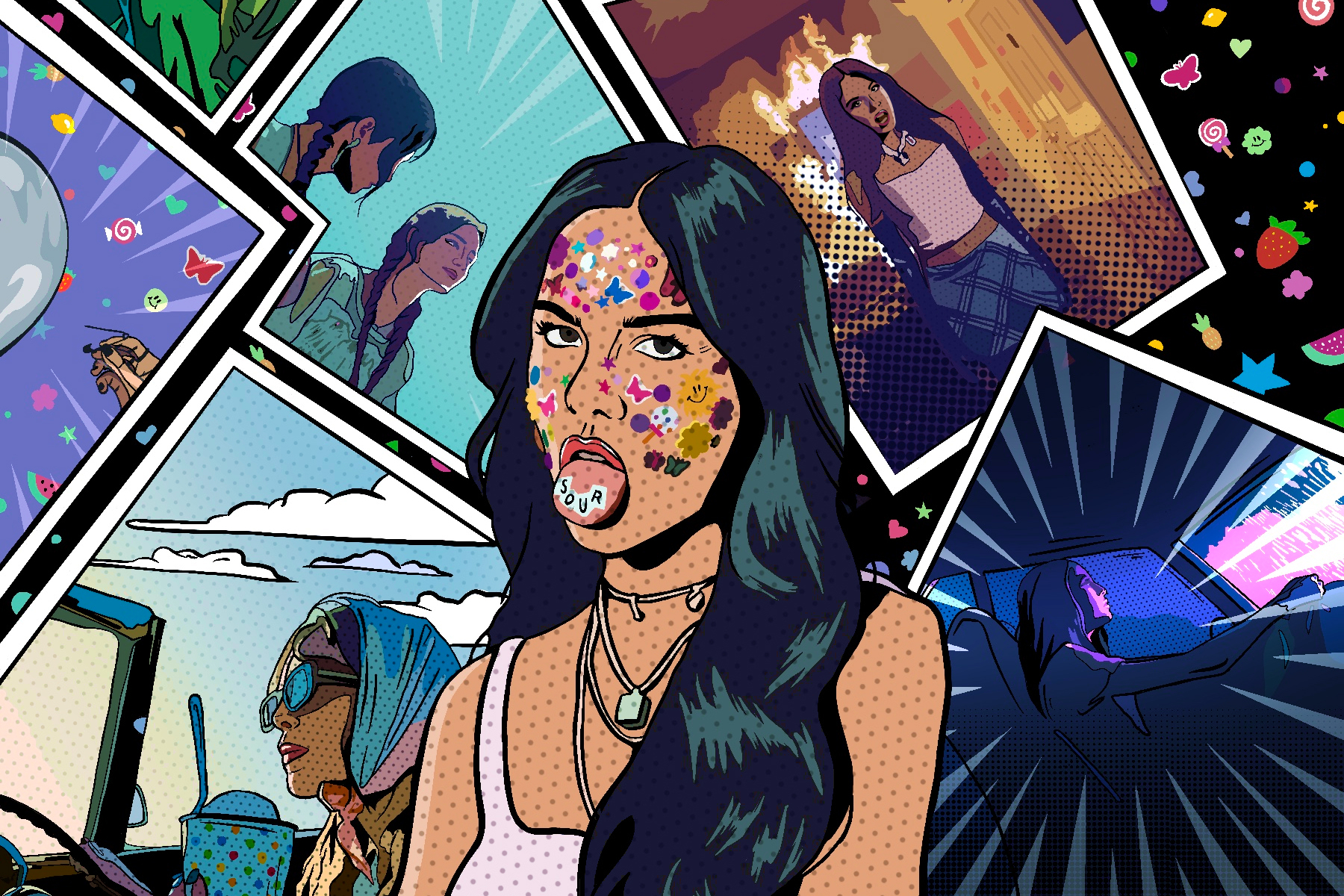After an incredibly hyped promotional period, Olivia Rodrigo’s debut album, “Sour,” stylized in all caps, was released on May 21. It was preceded by three singles — “Driver’s License,” “Deja Vu” and “Good 4 U.” The first and third singles reached No. 1 on the Billboard Hot 100, and the album debuted at No. 1 on the Billboard 200. “Sour” opened with the equivalent of 295,000 sales, including 301 million streams, giving Rodrigo the biggest opening and the second most-streamed album of the year. She might have begun her career with roles in Disney Channel’s “Bizaardvark” and the Disney+ series “High School Musical: The Musical: The Series,” but her newest venture has undoubtedly dominated the mainstream.
“Sour” is a difficult project to pin down. On the album’s sound, Rodrigo told Nylon, “I want it to be super versatile. My dream is to have it be an intersection between mainstream pop, folk music, and alternative rock. I love the songwriting and the lyricism and the melodies of folk music. I love the tonality of alt-rock. Obviously, I’m obsessed with pop and pop artists. So I’m going to try and take all of my sort of influences and inspirations and kind of make something that I like.”
Indeed, the tracklist reflects a diverse exploration of genre. Rodrigo starts the album with an angry, pop-punk rager called “Brutal.” She embellishes stylistic guitar riffs with lyrics like “I’m so sick of seventeen. Where’s my f—ing teenage dream?” and “Cause who am I if not exploited?” The song is raw and aggressive, but that is the crux of the album’s title. Rodrigo embraces anger, jealousy and other emotions that women tend to be shamed for — essentially, all things sour.
In an interview with Billboard, Rodrigo discussed pressures to include more love songs on the album. After the commercial success of her first two singles, both of which dealt with failed relationships, she feared being labeled “the heartbreak girl.” However, she opted to continue with the original direction of the album, saying, “I’m a songwriter who writes from a place of authenticity and truth. And truthfully, love and happiness and everything weren’t feelings that I was feeling at the time.”
At its core, “Sour” is a breakup album. There are heart-wrenching ballads like “Traitor,” in which Rodrigo laments, “Guess you didn’t cheat, but you’re still a traitor,” and “Happier,” where she pleads with an ex, “Oh, I hope you’re happy, but not like how you were with me.” Her lyrics are simple, focusing less on metaphor and more on artful honesty, but there is no doubt that audiences are compelled.
The closing track, a beautifully optimistic anthem called “Hope Ur OK,” tells the stories of several of Rodrigo’s childhood friends. She remembers a boy whose “parents cared more about the Bible than being good to their own child,” and a girl whose “parents hated who she loved.” Rodrigo acknowledges these harsh realities, yet also reminds fans how proud she is that they were created “with the courage to unlearn all of their hatred.” Seemingly a love letter to the LGBTQ+ community, the track cements Rodrigo as a compassionate ally.
Rodrigo makes it no secret how heavily she has been influenced by the artists that came before her. An avid Swiftie, she consistently names Taylor Swift as her biggest inspiration, and even interpolated Swift’s “New Year’s Day” on the song “1 Step Forward, 3 Steps Back.” Rodrigo has also discussed taking inspiration from artists like Lorde, Kacey Musgraves, Avril Lavigne and St. Vincent.
Rodrigo’s rise to stardom has been a quick one, with “Driver’s License” being released only in January. Accompanying her journey, however, has been a cloud of rumor and criticism. The aforementioned track is frank in its allusions to a love triangle, leaving audiences to speculate that the “blonde girl” mentioned in the song is former Disney star Sabrina Carpenter and the ballad’s target is Joshua Bassett, her HSMTMTS co-star.
While none of the speculation is confirmed, Rodrigo explained her songwriting process in an interview with Nylon, saying, “I’m a super specific songwriter. I always have been. I think the most impactful songs are specific. Broad storytelling just isn’t fun in any art medium.” Rodrigo has said she doesn’t mind the gossip and simply tries not to pay attention to it, but that has not stopped people from talking. It seems society will jump at any chance to take a voyeuristic look into the relationships of a 17 — and now 18 — year-old woman.
One can’t help but note that Rodrigo’s career parallels that of Swift in more than just their frank lyricism. For years, Swift has been followed by criticisms that she only writes songs about her exes. Not only is this claim decidedly untrue, but it points to sexist trends in the way audiences consume music. Male artists like Harry Styles, Ed Sheeran, The Weeknd and even Swift’s public rival Kanye West all write about past relationships in their music, but none have been criticized for it the way their female counterparts have.
Swift has dodged sexist interviewers who suggested she would be walking home from the Grammys with both a trophy and “lots of men” by responding that she would only be going home to her cats. She also directly addressed the sexual double standard in “The Man,” in which she says her romantic conquests would be celebrated as complex and cool if she was not a woman.
Rodrigo has already been hit with criticisms that she only writes songs about boys. On the topic, she said, “I don’t really understand what people want me to write about; do you want me to write a song about income taxes? How am I going to write an emotional song about that?” Unfortunately, women in the music industry are placed into an impossible double-bind; if she wrote about topics outside her purview, she would be criticized for overstepping, but speaking about her own experiences elicits criticism as well. It’s as if she can’t win.
Regardless, “Sour” has been a massive success. Not only is it fantastic to see a young woman thriving in such a big way, but Rodrigo is also Filipino American. She openly discusses staying true to her heritage and has been honest about her struggles with self-image. She candidly explained to The Guardian, “It’s hard for anyone to grow up in this media where it feels like if you don’t have European features and blonde hair and blue eyes, you’re not traditionally pretty.” She even alludes to this experience in “Enough For You” when she sings, “Cause I thought you’d like me more if I looked like the other prom queens I know that you loved before.”
Just as female pop artists like Swift have been an inspiration to Rodrigo, she herself has quickly become an inspiration to many others. Her honesty and integrity in the face of fame and misogyny have cemented her as a voice for the younger generations, and it is clear that her impact will not be short-lived.

















